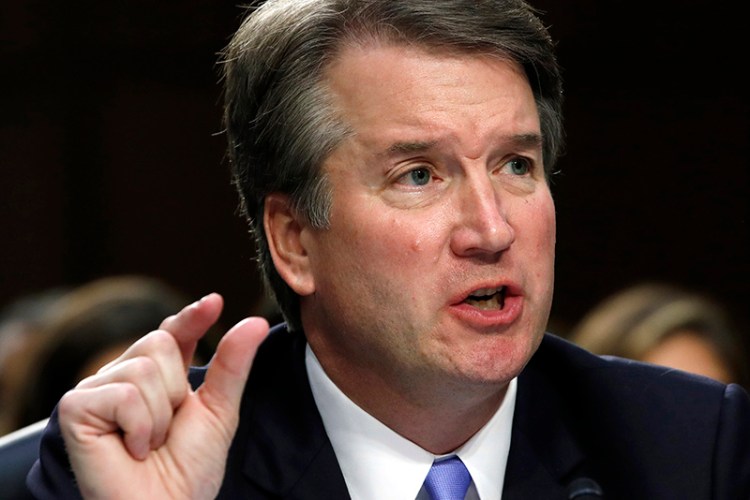The Senate Judiciary Committee delayed its vote on Supreme Court nominee Brett M. Kavanaugh until next week, as the deeply bitter fight over his confirmation intensified and a handful of moderate senators continued to deliberate privately over whether to support him.
The move was expected — senators routinely delay committee business for one week, which is allowed under the panel’s rules. The Judiciary Committee voted 11-to-10 on Thursday to hold the vote at 1:45 p.m. on Sept. 20, and Senate Majority Leader Mitch McConnell (R-Ky.) is expected to set full Senate votes on Kavanaugh’s confirmation for the final week of September.
The vote occurred as Democrats complained about the confirmation process and pressed for more documents from President Trump’s nominee.
“It has been rushed through to judgment in a highly partisan and failed way,” said Sen. Richard Blumenthal (D-Conn.)
Democratic senators and others working to defeat Kavanaugh’s confirmation believe Kavanaugh significantly misled the Judiciary Committee more than a decade ago on his involvement in controversial Bush-era programs and judicial confirmations.
One example that surfaced during the hearings and through newly-released records last week was Kavanaugh’s involvement in the confirmation of Judge William Pryor to the U.S. Court of Appeals for the 11th Circuit. Although Kavanaugh testified in 2004 he was “not involved in handling his nomination,” his emails from the White House counsel’s office show he received invitations for meetings and conference calls to discuss confirmation strategies for Pryor.
Under questioning last week, Kavanaugh clarified that while he may have attended meetings and hearing prep sessions, he wasn’t the primary White House official assigned to Pryor.
Senate Democrats also say Kavanaugh was not truthful to the committee when he said he wasn’t aware he had received documents obtained by Republican staffers on a server they shared with Democrats during the Bush judicial nomination fights.
Emails released last week, Democrats contend, bolster their argument that Kavanaugh should have at least known that the information had been taken without permission from Democrats. However, the emails themselves don’t detail how the information was obtained.
It’s unclear how much the accusations that Kavanaugh misled Congress will stick with the handful of senators in the middle who are being heavily lobbied by both opponents and supporters of Kavanaugh’s confirmation. “We’re looking into that, to see if there’s any credibility to it,” said Sen. Joe Manchin III (D-W.Va.) said Wednesday evening. “I think in all fairness and decency, you want to give him a chance to explain.”
Manchin is one of three moderate Democratic senators who are being furiously pressured by those on both sides of the Kavanaugh nomination. The others are Sen. Heidi Heitkamp (N.D.) and Joe Donnelly (Ind.). Most likely to influence the moderate Democrats’ vote on Kavanaugh is the possible fate of the Affordable Care Act, particularly as a lawsuit challenging its protections for pre-existing conditions winds its way through the courts.
In his confirmation hearing last week, Kavanaugh would not commit to upholding the provision of the health-care law that protects coverage for consumers with preexisting conditions. It was one of several hot-button topics on which he declined to comment because he said he did not want to compromise his judicial independence on a case that could come before him in court.
One still-undecided influential Senate Republican, Sen. Susan Collins (Maine), said she plans to follow up with Kavanaugh in a phone call later this week to settle some lingering questions. Sen. Lisa Murkowski (R-Alaska), who along with Collins supports abortion rights, also has yet to announce her vote.
Send questions/comments to the editors.


